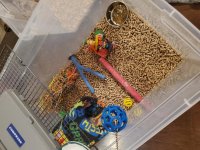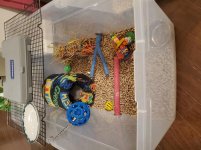BennyCal
New member
Hello I'm new to parrot ownership. I finally got the opportunity to purchase a handled baby. The breeder took my deposit and I just waited for Rico patiently. At 2 weeks old the breeder surprised me with you need to pick him up next week or he will refund the deposit and sell the baby bird to someone else.... I paid 1/2 of what I would have if I purchased local. Anyway... I got Rico at 3 weeks old. I have took him to the vet last week and he got a clean bill of health. I am getting to know the aviary store folks about an hour from here. Both say I am doing everything right. Feedijg the appropriate amount and paying the appropriate amount of attention. For the last 4 weeks straight my baby parrot is squawking non stop. He does it when I have him in my lap, when he is playing with toys, while eating, while along... only stops to sleep. He has a tent in his temp enclosure, toys, heat lamp, chemical free pine bedding, you name it. I cant train him to be quiet because he is still to young for treats. Anyone ever had a baby parrot do this? Help!!!!

